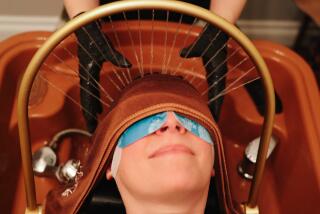Haircut, and a haven
Oak Creek, Wis. — EVER since Lyndon B. Johnson sent the first large waves of troops to Vietnam, retired Army Sgt. Jim Stollberg has been providing soldiers with the height of military style here at the Tri-City Barber Shop.
Want a burr cut? How about a traditional flattop? Or a high-and-tight that even the pickiest drill sergeant will approve?
Come inside. Sit down. Chat awhile. Stollberg is ready to listen.
He starts his day as he has for more than 45 years -- resting one hip against a worn, black-leather barber’s chair, a trio of combs stuffed into his front shirt pocket. With a military crispness that demands an immediate answer, Stollberg asks each customer, “What can I do for you, sir?”
Don Olsen, a senior master sergeant with the Air Force Reserves, runs a hand through his crew cut.
“I am pretty shaggy and it’s inspection time this weekend,” says Olsen, 43. “Can you clean me up?”
Over the decades, Stollberg and the other barbers at Tri-City have done more than cut hair: They’ve established a haven for military manhood -- a retreat where soldiers can swap jokes, gripe about sports and quietly share worries about the future.
Wives? Girlfriends? They either stay at home or wait outside in the car.
“We barbers are a cross between a bartender and a chaplain,” says Stollberg, 67. “It’s tough to really get things off your chest if your girl is hovering over your shoulder, complaining about how much I’m taking off the top.”
The wars being fought have changed, Stollberg said, but the conversations with the guys in his chair have stayed the same.
Over the hum of the shop’s electric clippers, men have wondered whether their gear would protect them in Bosnia. Now those heading to Afghanistan and Iraq question the same thing. Some mourned getting “Dear John” letters while serving in Vietnam. These days, the men tear up when talking about lovers breaking up with them by e-mail, or being told by instant message that their wife wants a divorce.
By the time the men pay their $12.75 bill, they often have ticked off some of the key chores they must finish before heading overseas.
“You make out a will. You clear off your ‘honey do’ list. And you get a haircut,” says Col. Merle D. “Mad Dog” Hart, the wing commander of the U.S. Air Force Reserve’s 440th Airlift Wing, a 1,700-person unit fondly known as the Flying Badgers, based in nearby Milwaukee. The unit flies missions in Iraq and Afghanistan, and has been charged with dropping off crews and supplies to desert outposts.
Some of the unit’s members return from their tours with souvenirs for the shop, adding to the military tchotchkes collected over the years.
Stickers affixed to the shop’s mirrors honor those who served in Vietnam. A small wooden carving of a C-130, a cargo plane flown during Vietnam, sits on top of the cash register. An American flag that military crews flew over Afghanistan during the current conflict hangs on the wall.
But decades of military patronage to Tri-City Barber could be ending.
By the end of September, the Air Force will close Gen. Mitchell Air Reserve Station and move the unit to North Carolina -- taking away the core of the shop’s regular customers.
Unit members say they expect to be redeployed to Iraq by next spring.
ON a recent weekday, a dozen men are waiting their turn for a trim. Outside, there’s no sign on the front glass door, only an old-fashioned barber’s pole to serve as a beacon. Inside, the fluorescent lights cast a stark white spotlight on customers as they sit in the shop’s four chairs.
It’s a typical weekday crowd. An aging warrior who served in the Army during World War II and an officer who spent time in Korea chat about how the Green Bay Packers will do this season. Two young Marines, visiting family in Milwaukee, lounge against the shop’s whitewashed wood-paneled walls. They good-naturedly argue about what music to load onto their iPods before shipping off to Iraq.
Stollberg fussed over the few straggling hairs clinging to one customer’s nape. After spending a lifetime immersed in military culture, he’s used to such chatter among men.
His father fought in Europe with the Army in World War I. Two older brothers -- one an Army Air Forces pilot, the other in the Army infantry -- enlisted in World War II. Another brother served in Korea. A fourth signed up for Vietnam.
“It was something that was expected. To serve your country was to do your duty as a man,” Stollberg said. “I was a ‘tweener -- falling between Korea and Vietnam -- so I joined the Army Reserves.”
At 5 foot 10 and nearly 200 pounds, with hands large enough to palm a watermelon, Stollberg looks more like a boxer than a stylist.
But a friend suggested he enroll in barber school when his basic training was complete in 1962.
Months after he first picked up a pair of scissors, Stollberg volunteered to work at Tri-City Barber -- and stayed.
He bought the shop in 2001.
Over the years, most people have relied on word of mouth to find the shop, located in a bedroom community (pop. 32,000) south of Milwaukee.
Fathers tell their sons. Officers send their rumpled recruits, threatening to pull their pay if their hair touches their ears.
Like taking out the trash or mowing the lawn, the men pop by the shop every week to say hello and get a cut.
“Some might call it vanity,” Stollberg says. “We call it following regulation.”
During times of war, the haircuts became less about maintenance and more about squaring things away. Stollberg recalls cutting his nephew’s hair weeks before his Navy unit was deployed to Vietnam.
“I remember thinking, ‘This is what my head must have looked like before I got my first cut,’ ” Stollberg says. “I knew what it would feel like, sweating inside a helmet.”
Starting at the young man’s nape, Stollberg says, he slowly worked his way upward, carefully cutting around the ears. Tufts of light brown hair covered the black and white checkerboard floor.
It took three minutes. His nephew gave him a hug as a tip.
REQUIRING a particular haircut among American troops dates back to the Revolutionary War, said Carol Burke, an English professor at UC Irvine and author of “Camp All-American, Hanoi Jane, and the High-and-Tight,” which explores the various facets of masculinity in military life.
It was partly an issue of practicality: Longer hair is more difficult to keep clean.
“There was also the question of uniformity,” Burke said. “The idea is that, whether it is shoes or facial hair, a sense of group identity is created by making sure everyone looks alike.”
New recruits will often be nearly bald at the beginning of basic training, their heads quickly and efficiently shaved like sheep on shearing day. As time passes, the recruits learn how far they can push the boundaries on hairstyle and length.
The options are almost indistinguishable to civilians: the crew cut (the hair no longer than a quarter-inch all over); the high-and-tight (buzzed to the skin at the neck and on the sides, with hair no longer than 3 inches on top); the flattop (the hair on top of the head shaved flat, often with a strip of scalp peeking through); and the full-dress (a bit longer on the top and sides).
Each day at the shop is different. Later in the week tends to be busier for reservists, as “guys prefer to get their haircut right before weekend inspections,” Stollberg said. Sometimes the rush comes midweek, as military members arrive in town a few days early to meet with friends and finish a few errands -- like getting a haircut.
This particular Wednesday starts out slow. It’s 7 a.m. when Stollberg unlocks the glass front door, steps inside and reaches for a mop.
For an hour, he cleans the floor and polishes the silver metal footrests on each barber chair. He straightens the white canisters of pomade and pops a handful of combs into a turquoise-colored sanitizing solution.
The door opens. It’s Frank Summers, 66, Stollberg’s friend and longtime fellow barber. The two men greet one another. Stollberg slips a sky-blue tunic over his navy slacks and runs a hand over his short gray hair.
At 8:30 a.m., the first few customers begin to trickle in. Flipping through copies of Popular Mechanics, the men chatter about whose house needs a fresh coat of paint and who lost a Corvette in a recent divorce.
When they muse quietly about the current war, the discussion lasts for a few minutes -- then quickly moves to their latest golf scores.
Only a few topics of conversation are considered off-limits here. Religion is one. Politics is another.
So is death, unless, of course, the barbers and customers need to grieve for one of their own.
“We lost an entire local Air Force crew in Panama in the 1990s. We lost more men than I can remember in Vietnam. Some in Bosnia too,” said Summers, who has worked in the shop for 42 years. “Now they’re dying in Iraq.”
So far, 73 military Wisconsinites have been killed in Iraq. Seven have died in Afghanistan. The shop’s three barbers -- Stollberg, Summers and Shari Tracy, 46 -- guess they’ve cut the hair of at least one-fifth of them.
Often, they don’t have to ask if someone has been killed.
On a recent afternoon, an older man steps up to Stollberg’s chair. His face is pale and drawn, his eyes glazed. His graying blond hair is tousled, curling at the tops of his ears.
“What can I do for you, sir?” Stollberg asks with a grin.
In a broken voice, the man requests a trim.
Stollberg’s face instantly sobers. He reaches for the electric clippers. Minutes pass. Only the whine of the electric razor can be heard.
As Stollberg finishes, he reaches for a white boar’s hair brush and gently sweeps the back of the man’s neck. The man stares into the mirror and nods. It’s perfect.
“I have a memorial service to go to in D.C. this weekend,” the man said. “My son. He was a Marine. In Iraq. He came here once, and said this was a good place to get a haircut.”
In recent weeks, local news reports about the base closure’s likely effect on the barber shop has lured a new crew of customers, many of them retired military men in search of a traditional hairstyle that recalls their youth. Stollberg hopes the business will continue to thrive and the shop will survive after the Flying Badgers leave later this year.
But he’s getting older. Perhaps it’s time to start thinking about retirement.
The front door opens. Stollberg looks up. It’s Bud Henderson, 58, an Air Force senior master sergeant who spent all of 2005 in Qatar.
Stollberg greets him by name and asks, “What can I do for you, sir?”
More to Read
Sign up for Essential California
The most important California stories and recommendations in your inbox every morning.
You may occasionally receive promotional content from the Los Angeles Times.










